Jesus Army sex scandal: The dark secrets of life in a commune
- Published
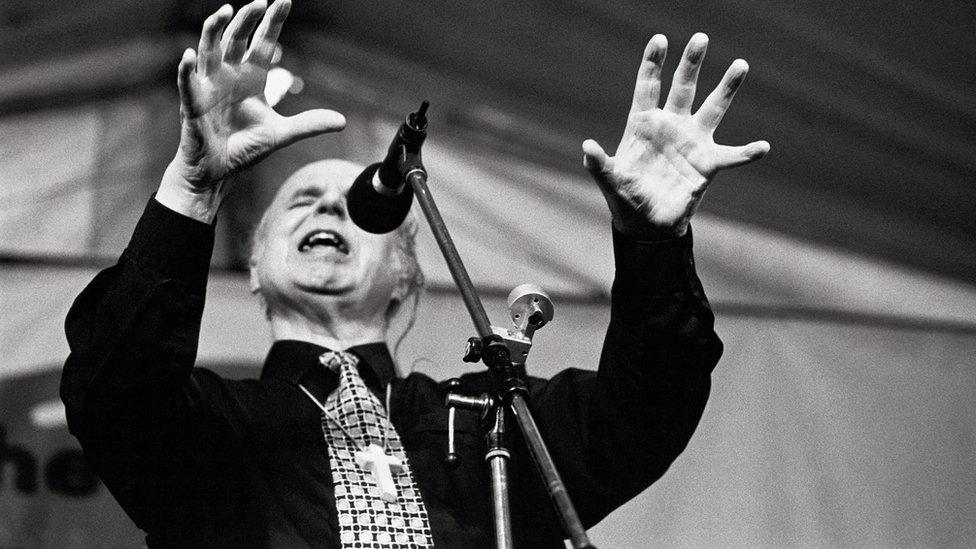
Noel Stanton, founder of the sect, preached about sins of the flesh
Hundreds of former members of the Jesus Army are seeking damages for alleged abuse inside the religious sect.
Ex-members have told the BBC how children suffered sexual, physical and emotional abuse on a "prolific scale", with most claims relating to incidents in the 1980s and 1990s.
The Baptist sect is to close but is the subject of a renewed police inquiry.
The Jesus Army has apologised to anyone "who experienced harm in the past" and urged victims to contact police.
Ten people from the Jesus Fellowship Church - later known as the Jesus Army - have been convicted for various sex offences.
'Beaten with rods'
Launched in the manse of a small chapel in Northamptonshire in 1969, the Jesus Army grew quickly in wealth and number.
At its peak the JFC had more than 2,000 members, hundreds of whom lived together in close-knit communal houses throughout central England.
It offered homeless or vulnerable people and god-fearing families the promise of "new creation" through a devout, all-encompassing way of life.
Residents submitted to an intense regime of work and worship. All of their income was given to a common purse and everything was shared - from underwear to parenting.
Children could be disciplined by any adult, while youngsters and newcomers were assigned to a male "shepherd" to oversee their spiritual development.

The Jesus Army's brightly coloured buses took members to find new recruits
By the age of 12 or 13, children were often separated from their parents.
Ex-members say it was typical for adults to enter their bedrooms while they undressed, or watch them take a bath.
The BBC has heard that children as young as three who misbehaved could be stripped from the waist, told to bend over and hold their ankles, and beaten with a rod.
Rape, bullying, brainwashing
Community members lived under the unchallenged authority of the movement's creator, Noel Stanton.
He was a firebrand who preached daily about sins of the flesh, and cursed wayward members as "backsliders" who were going to hell.
Mr Stanton founded the JFC on a huge enterprise of shops, businesses and two large farms, generating millions of pounds in annual turnover.
After his death in 2009, the church handed allegations of sexual offences against Stanton and others to Northamptonshire Police.
The BBC can now reveal that 43 people who were active in the church have been linked to reports of historic sexual and physical abuse.
It is understood further claims have come to light such as rapes, bullying, brainwashing, forced labour, financial bondage and "barbaric beatings" of young boys by groups of men.
Detectives have launched a new "comprehensive" inquiry into historic abuse by the church and evidence of a cover-up by five former leaders.
However, a survivors' group has raised concerns about the level of compensation being proposed by the church. It is now preparing group legal action involving hundreds of claimants.
A spokesman for the JFC insisted a formal redress scheme was being developed "to provide money and counselling" to "those who had suffered poor treatment in the past".
It said the scheme had been set up with external stakeholders to ensure everyone was dealt with in a "transparent and even-handed way"
Rose's story
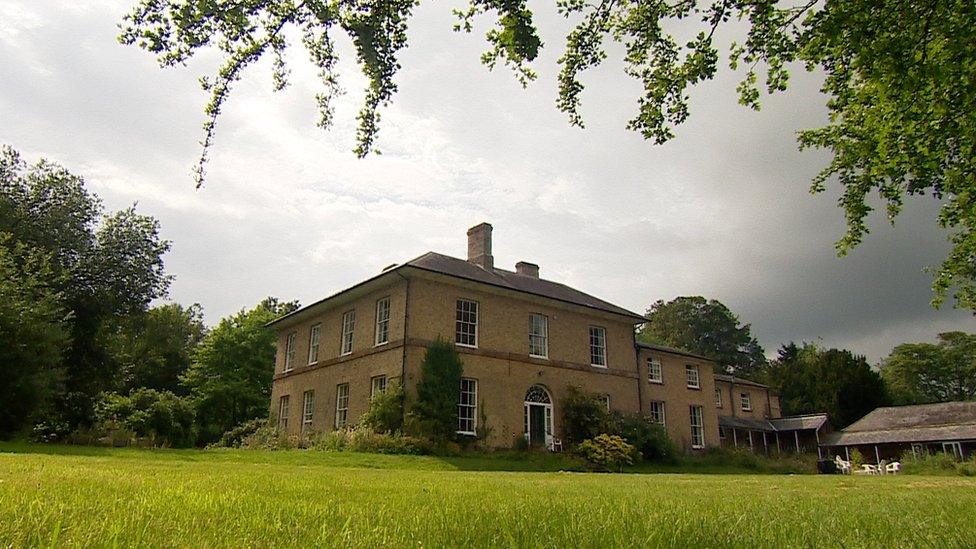
New Creation Hall in Northamptonshire was the birthplace of the JFC
"I don't remember ever feeling safe as a child, I think people thought God would protect their children," says Rose, which is not her real name.
She is one of a number of alleged victims who have told the BBC about their experiences inside the Jesus Army.
Rose was a baby when her family moved to a commune in the 1980s.
She says the intense regime made it a frightening place to grow up, with "loud and scary exorcisms" taking place at every meeting.
"I remember very strongly as a child a man manifesting next to me, shouting, screaming, retching and being sick on the floor," she says.
Fervent sessions of worship were held in the evenings with songs, prayer and speaking in tongues, while most weekends were spent on recruitment drives in towns and cities. Followers donned military-style uniforms and drove rainbow-coloured buses.
Rose explained that one of the main teachings was "there is nothing good in you as a person".
"Everything in you was the result of sin, and I developed a complete self-loathing because of that message," she says.
Rose said children were regularly "disciplined" by adults, including homeless people and drug addicts picked up off the streets.
"There was something about public discipline... being whacked in front of a whole congregation of people, that was very humiliating."
Rose says that when she was 12 years old an older man in her commune began to groom and molest her "every weekend".
She says he used to touch her leg under the dinner table or fondle her breasts while handing her money to get an ice cream.

The Jesus Centre, former home of the group, in Northampton
"At the time, I didn't know what was going on," she says. "I hadn't thought or talked about my body and he used that to molest me and continued to do it every weekend."
She knew the situation was "weird and uncomfortable" but felt "he must have had a reason for doing it".
When she was 15 years old, she says another prominent figure in the church led her behind a building and forced her to perform a sex act on him.
"I knew something had happened that was wrong and felt a lot of shame," Rose says, but added that "women were there to serve. We were always subordinate."
It was typical for women to be seen as temptresses who corrupted male members, former members said.
So when her abuser told the church what had happened, Rose says she was blamed for it.
She is now hoping to receive compensation from the church's redress scheme, and is considering going to the police about her alleged abusers.
Ben's story
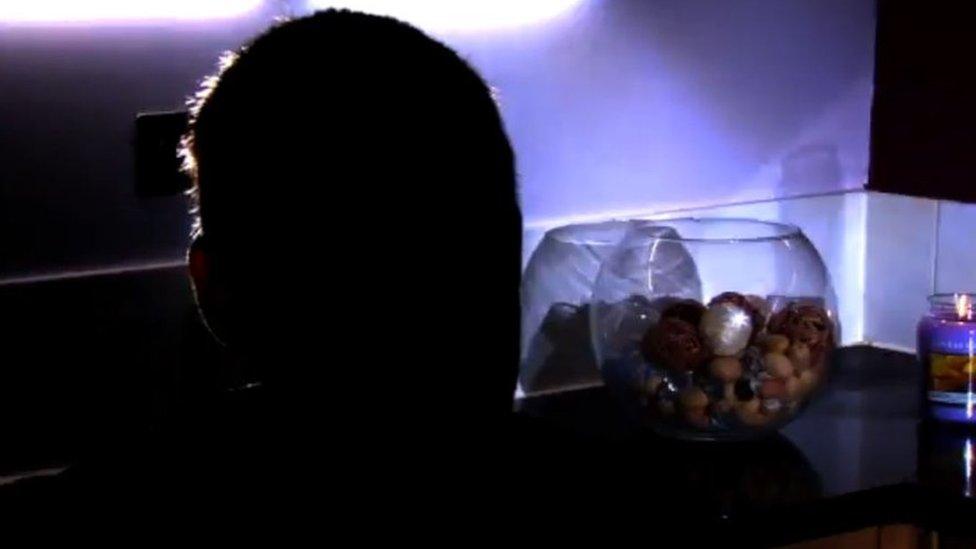
Ben says he was sexually assaulted at the age of six
Ben, whose name we have changed, was born into the community in the 1980s.
When he was six years old he says he found himself alone in the grounds of his commune with a male worshipper who undressed and sexually assaulted him.
"My dad's mum used to say how happy and smiley I was, but [after he was abused] I don't remember anyone ever saying that again," he says.
"The memories afterwards are all isolation. I withdrew into myself as a child and I had no friends in particular."
Ben became distanced from his family and left the church when he was 17 years old.
Recently he discovered his siblings had suffered similar experiences, including one of his brothers who he says was raped during much of his teenage life.
"I believe that at least five of us have been abused in one way or another," he says.
"I have anger for the church. I have anger because of what they did to my family. Whether they chose to ignore it, or give it to God, they're still culpable for letting it happen."
"There are still some beautiful people in the church with the best intentions," Ben adds. "But everything's been overshadowed by what happened in the houses."
Ben has been speaking to police about pursuing a criminal investigation against his abuser, but says so far there has been little progress.
Philippa's story
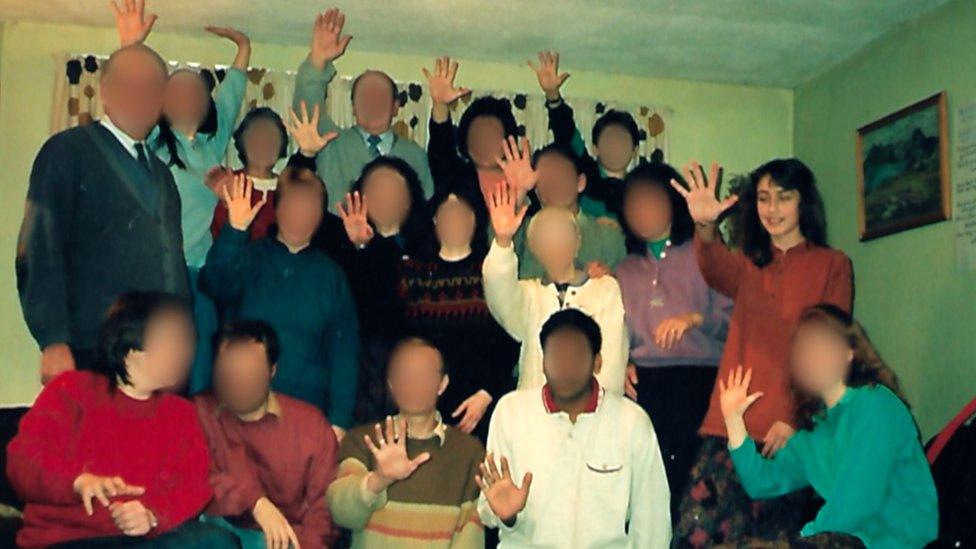
Philippa Muller, far right, during her time in the Jesus Army
Philippa Muller's family moved from Surrey to the birthplace of the JFC community, New Creation Hall, in Northamptonshire, when she was seven years old.
Her father worked in the local tax office and handed over every penny of his earnings to the church's communal purse.
Philippa's mother, like most of the other women, was a "servant" and spent her time cooking and cleaning to ensure the men of the house could do their "godly work".
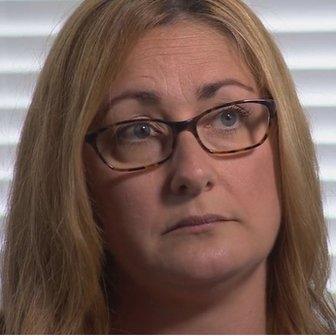
Philippa began living with the Jesus Army when she was seven
Women were encouraged to claim benefits and give them to the church.
"I grew up with a very negative imprint as to what it was to be a woman," Philippa says.
Young people were urged to recant their sins - real or imagined. They were taught about demonic manifestations and were present during exorcisms.
Philippa became increasingly isolated. "You couldn't just go to have a coffee with someone, or go to the cinema. That was all forbidden.
"We weren't allowed to socialise. We didn't have TVs. Things were censored... bits from the papers were cut out."
One of Philippa's close friends fled the church after she was assaulted by a male elder.
Philippa became a key witness in the court case - in which the elder was convicted - but says she was "persecuted" by the church community which treated her as a traitor and liar.
She left the church shortly afterwards.
Now on the brink of closure, the Jesus Army is understood to have accrued assets worth £50m. But it leaves a harrowing legacy - and an unsettled future for Philippa and its many other victims.
- Published29 May 2019
